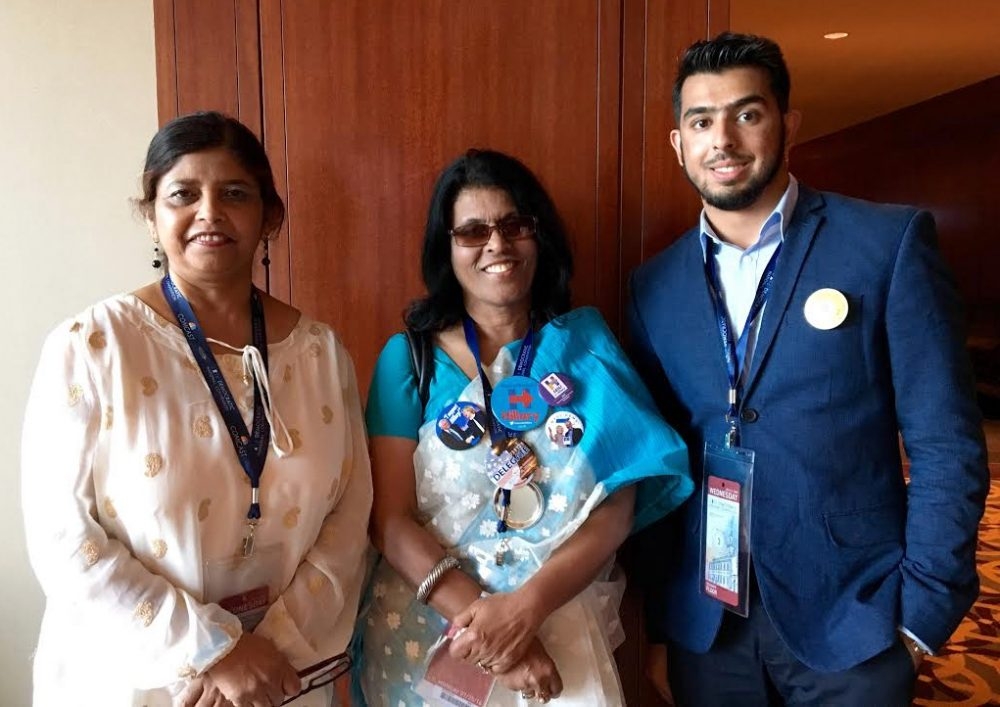Greetings of As-salaam-Alaikum — “Peace be unto you” — echo throughout a conference room in downtown Philadelphia. Muslim voters from around the country settle in with smiles, handshakes and hugs. An imam opens the luncheon with a prayer.
This is the American Muslim Democratic Caucus, and there are nearly a hundred of them here for the Democratic National Convention — including several delegates from Massachusetts.
Asima Silva, of Holden, says that as both a Muslim and a Democrat, it’s been difficult to watch this presidential election unfold.
“The issues that we’ve been dealing with are very personal, in terms of faith, in terms of our social lives, in terms of our kids, our future,” she says.
Silva says those stakes are clear to her 6-year-old daughter, who had a request before Silva left for Philadelphia.
“She’s only heard a couple of conversations and whatever happens in school,” Silva says, “and before we left she said to me, ‘Mom, make sure Donald Trump doesn’t get elected so people don’t hate us.’ ”
In the context of worldwide terror attacks and increasing anxiety over immigration, this presidential election cycle brings into stark relief the intersection of civic duty and faith for some Muslim voters.
Twenty-four-year-old Noman Khanani is a graduate of the University of Massachusetts Amherst. He fits several demographics important in this election — as a Bernie Sanders delegate, as an immigrant from Pakistan, as a Millennial, and as a Muslim.
“There’s a lot of pressure because obviously, I’m one individual, I can’t speak for an entire faith,” he says. “It’s unfortunate to be in that position but it’s also a privilege, I think, as well, when I get to be somewhat representative of my community, to get the word out about who we are. I wish things didn’t have to be this way, it’s not ideal … but I’m ready to own up to it.”
To be a Muslim in America is to be unavoidably at the center of this election. Trump has said in varying degrees that Muslim immigrants should be banned from entering the country. It’s activated a conversation about what it means to be Muslim in America.
“I actually think that I and us, Muslims, should use this opportunity of Donald Trump making those remarks as a waking up opportunity,” says Homaira Naseem, of Boylston, who’s attending her first national convention.
She says that while sometimes hurtful, the anti-Muslim rhetoric from Trump could prove useful.
“He has poked us,” Naseem says, “he has woken us up when we need to be publicly engaged; we need to be politically engaged so that our voices can be heard. So I take this as a positive thing.”
U.S. Rep. Jim McGovern, who represents the large immigrant city of Worcester, is also at the caucus.
“In my constituency I have a vibrant Muslim community that contributes to our cities and towns, that teach our kids that serve on our law enforcement, who are just incredible members of our community,” he says.
Being a member of that community is just as valuable to Khanani and his family. He says being politically and civically minded is a duty.
“Myself and my parents and previous generations, the moment we decided to step into this country was the same moment we decided that we were going to be contributing citizens or residents of this nation,” he says.
And at least for these Muslim delegates from Massachusetts, that contribution includes expressing their love of faith and of country.
This report comes from the New England News Collaborative. Eight public media companies coming together to tell the story of a changing region, with support from the Corporation for Public Broadcasting.
